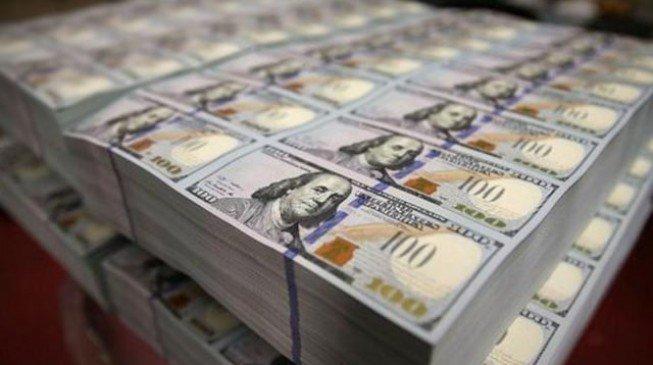Money market
Bank lending rate hits 29.13% in December 2022
The maximum lending rate for Nigerian banks rose to 29.13 per cent in December 2022 from 28.14 per cent recorded in the previous month and 27.58 per cent in the corresponding period of 2021.
Lending rates increased on the back of the multiple rate hikes by the Central Bank of Nigeria in 2022. Specifically, the CBN raised the benchmark interest rate by a collective 500 basis points to 16.5 per cent, representing its highest rate in 21 years.
According to the money and credit statistics from CBN, the maximum lending rate averaged 28.09 per cent in 2022 compared to 28.06 per cent recorded in the previous year. Meanwhile, the prime lending rate stood at 13.85 per cent from 13.17 per cent recorded in the preceding month.
The one-month deposit rate increased to 8.15 per cent in December 2022 from 7.38 per cent recorded in November.
3-month deposit rate stood at 8.79 per cent in the review period, an increase from 8.45 perc ent recorded in the previous month.
The 6-month and 12-month deposit rates stood at 8.68 per cent and 8.22 per cent respectively in December 2022.
The savings deposit rate climbed to 4.13 per cent in December, the highest since April 2017.
Despite the interest rate increase, Nigeria’s private sector’s credit rose by N6.61 trillion in 2022 to close the year at N41.8 trillion, the highest on record.
Compared to the previous year, net loans increased by 23.65 per cent compared to N5.04 trillion recorded in 2021, and a 47.7 per cent increase from 2020.
In the same vein, credit to the government increased significantly, with N11.33 trillion in new credit being acquired in the period under review, representing a 92 per cent surge from 2021’s loan figure.
The CBN maintained an aggressive hawkish stance in the second half of 2022 to curb inflation, and mop-up excess liquidity by discouraging loans in the economy.
However, businesses in need of cash have acquired more loans despite the high-interest rate regime.
By implication, this could affect the ability of businesses to repay the loans. An alternative will be to pass the cost to the consumers, which could further exacerbate the inflationary pressure in the country.
Banks and lenders stand to gain from the high-interest rate environment adopted by the CBN.
Considering that a large chunk of the revenue generated by commercial banks is from interest income, which is a function of interest rates, banks could be set to earn more from their loans to customers. However, high-interest rate portends the possibility of non-performing loans.
A cursory view of the financial statements of top publicly quoted banks on the Nigerian Exchange showed that interest income increased by 30 per cent year-on-year in Q3 2022, earning a whopping sum of N1.15 trillion compared to N888.36 billion recorded in the corresponding period of 2021.
For the nine months, interest income rose by 24.6 per cent to N3.14 trillion from N2.52 trillion earned in the same period of the same year. These numbers seem set to increase further when the banks begin to release their full-year results.
Money market
LCCI advocates discipline, export to sustain Naira appreciation


LCCI advocates discipline, export to sustain Naira appreciationThe Lagos Chamber of Commerce and Industry (LCCI) has emphasised the importance of maintaining discipline in the foreign exchange market to sustain the steady appreciation of the Naira.
The President and Chairman of the Council of LCCI, Mr Gabriel Idahosa, made the call in an interview with newsmen on Wednesday in Lagos.
Idahosa praised the efforts of the Central Bank of Nigeria in imposing discipline, attributing the recent Naira appreciation to curbing speculative activities.
“On the monetary side, the CBN is doing it. The primary efforts should continue to impose discipline in the foreign currency market.
“The abuses in the foreign currency market were prevalent and most of the fall in the value of the Naira in the last six months is not because there was any sudden calamity in the Nigerian economy.
“It was primarily because of very reckless speculations, that people were just speculating in the dollar, they had nothing to export, nothing to import, they were just buying the dollar for speculative reasons.
“And once the Central Bank started to impose discipline in the foreign currency market, we saw the value of the Naira rising very quickly by stopping speculation,” he said.
According to him, the strategies of the Central Bank, now, are designed to achieve a sustained discipline in the foreign currency market.
Idahosa highlighted the need to continue reducing the number of Bureau de Change operators, stressing that many operated without contributing to international trade.
He applauded the Central Bank’s move to enforce documentation and identification of buyers and sellers at BDCs, aiming to deter reckless speculation and curb illicit financial flows.
On the fiscal side, Idahosa urged President Bola Tinubu to prioritise a nationwide export drive, citing it as the key to bolstering the Naira and providing essential foreign exchange.
He emphasised the importance of fostering a culture of export among Nigerians across all scales of enterprise to reduce reliance on imports and strengthen the country’s economic resilience.
Money market
Foreign reserves decline to $32.29bn


The foreign reserve has depleted to $32.29 billion, which is a six-year low in the Central Bank’s course to save the naira.
This is the lowest level the reserves have been since September 25, 2017, when it was $32.28 billion.
The country’s foreign reserves declined by 6.2 percent, losing $2.6 billion since March 18, when the naira started its rebound from record-low levels against the dollar to $32.29 billion as of Monday, based on the latest available data from the CBN.
At the beginning of the month, the reserve was at $33.57 billion, then further dipped to $32.6 billion by April 12.
This comes as the CBN has attempted to save the naira through various interventions such as raising interest rates to 24.75 percent and managing foreign exchange trades.
It stepped up its intervention in the FX market with sales at both the official market and to BDC operators who sell dollars on the streets.
The apex bank, which sells $10,000 to each BDC every week, mandated them to only sell at a spread of 1.5 percent, which comes to N1,117 per US dollar.
The rate sold by the BDCs has set a defacto floor for the naira in the black market since the apex bank resumed sales to them in February.
Also, last month the CBN said it had cleared a backlog of $7 billion since the beginning of the year. That was built over the years as the central bank pegged its currency against the dollar, leading to a scarcity of foreign currency that deterred foreign portfolio investment. However, it’s unclear how much dollar debt the CBN retains on its books.
Akpan Ekpo, a professor of economics and public policy, said the CBN’s managed float system in which it is trying to ensure supply and curtail demand is not sustainable in the long term.
He said the CBN needs to be careful with how it depletes the foreign reserves as its main source is oil revenue.
“We need to manufacture non-oil goods and services, export them, and get foreign exchange and not depend on oil income,” he said.
Money market
CBN expresses commitment to harnessing digital technologies


The Central Bank of Nigeria says it is committed to harnessing the power of digital technologies to enhance financial inclusion.
CBN Governor, Mr Yemi Cardoso said this on Tuesday in Abuja, during a strategic institutions tour by participants of Senior Executive Course 46 of the National Institute of Policy and Strategic Studies (NIPSS).
Cardoso, who was represented by Dr Bala Bello, Deputy Governor, Corporate Services, said that digital technologies would also boost productivity and create an enabling environment for innovation and entrepreneurship to thrive.
According to him, the apex bank has already deployed robust digital technologies in driving most of its processes towards achieving optimal performance.
He said that NIPSS, as a foremost national policy think-tank, had made invaluable contributions to the socio-political and macroeconomic development of Nigeria.
“We are, therefore, not surprised at the apt and relevant choice of your research theme.
“The CBN and NIPSS have had a long-standing and robust working relationship since the establishment of the institute. This has culminated into positive mutual benefits for the two institutions.
“The CBN, on the one hand, has provided infrastructural support to the institute through construction of an auditorium and a hostel, in addition to the provision of technical support.
“On the other hand, NIPSS has supported the technical capacity of the CBN through the training of some personnel both at senior executive course level and intermediate course cadre,” he said.
The Director-General of NIPSS, Prof. Ayo Omotayo, said that the study visiting would be representing the institute in getting information from operators of the apex bank on the relevance of digital technology to developing jobs for Nigerian youths.
According to Omotayo, a lot of progress has been made globally in using digital systems to run the economy.
“The more of our activities that we can put in digital format, the more we get the opportunity of providing employment access to a whole lot of the 120 million active Nigerians.
“We at NIPSS always knock at the frontiers of knowledge, checking what is going to happen in the immediate future.
“We are working towards a system where we believe that almost every service can be delivered digitally,” he said.
The Acting Director, Monetary Policy Department of the CBN, Dr Lafi Bala Keffi, commended the NIPSS study group for its interest in the apex bank.
She urged the participants to explore the time-tested culture of NIPSS, which is to diagnose national, profer practical solutions and recommend ways of making such solutions realisable.
-
Finance3 months ago
Court orders Sen. Victor Umeh to repay N136m bank debt to AMCON
-



 Abuja Update2 months ago
Abuja Update2 months agoUNDP, FG partnership needed to achieve inclusion, equity- Minister
-
Abuja Update4 weeks ago
Banks drive stock market performance with N147bn gain
-



 Infotech3 weeks ago
Infotech3 weeks agoWorld Backup Day: NITDA urges Nigerians to ensure backup of data
-
capital market2 years ago
Rt.briscoe, FBNH, Others halts negative performance of stock market
-



 Health2 weeks ago
Health2 weeks agoImmunisation: FG, GAVI seek synergy with Sokoto Govt.
-
Infotech1 week ago
Forex for Beginners: Unveiling the currency exchange and how to trade it
-
Submission Guidelines4 months ago
CALL FOR SUBMISSIONS: POETRY COLUMN-NND














